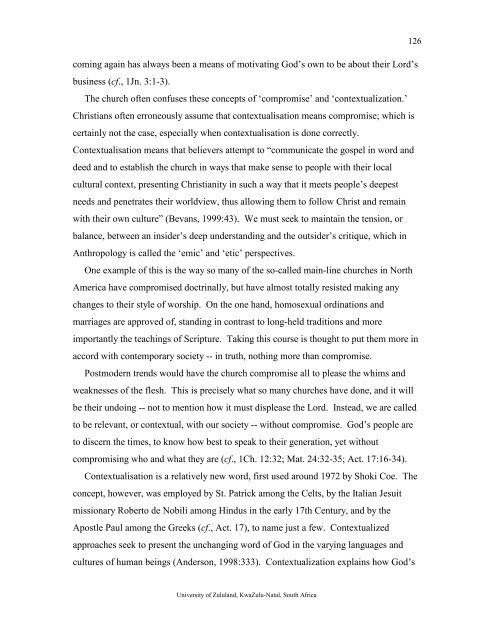Haase_UZ_x007E_DTh (2).pdf - South African Theological Seminary
Haase_UZ_x007E_DTh (2).pdf - South African Theological Seminary
Haase_UZ_x007E_DTh (2).pdf - South African Theological Seminary
You also want an ePaper? Increase the reach of your titles
YUMPU automatically turns print PDFs into web optimized ePapers that Google loves.
126<br />
coming again has always been a means of motivating God’s own to be about their Lord’s<br />
business (cf., 1Jn. 3:1-3).<br />
The church often confuses these concepts of ‘compromise’ and ‘contextualization.’<br />
Christians often erroneously assume that contextualisation means compromise; which is<br />
certainly not the case, especially when contextualisation is done correctly.<br />
Contextualisation means that believers attempt to “communicate the gospel in word and<br />
deed and to establish the church in ways that make sense to people with their local<br />
cultural context, presenting Christianity in such a way that it meets people’s deepest<br />
needs and penetrates their worldview, thus allowing them to follow Christ and remain<br />
with their own culture” (Bevans, 1999:43). We must seek to maintain the tension, or<br />
balance, between an insider’s deep understanding and the outsider’s critique, which in<br />
Anthropology is called the ‘emic’ and ‘etic’ perspectives.<br />
One example of this is the way so many of the so-called main-line churches in North<br />
America have compromised doctrinally, but have almost totally resisted making any<br />
changes to their style of worship. On the one hand, homosexual ordinations and<br />
marriages are approved of, standing in contrast to long-held traditions and more<br />
importantly the teachings of Scripture. Taking this course is thought to put them more in<br />
accord with contemporary society -- in truth, nothing more than compromise.<br />
Postmodern trends would have the church compromise all to please the whims and<br />
weaknesses of the flesh. This is precisely what so many churches have done, and it will<br />
be their undoing -- not to mention how it must displease the Lord. Instead, we are called<br />
to be relevant, or contextual, with our society -- without compromise. God’s people are<br />
to discern the times, to know how best to speak to their generation, yet without<br />
compromising who and what they are (cf., 1Ch. 12:32; Mat. 24:32-35; Act. 17:16-34).<br />
Contextualisation is a relatively new word, first used around 1972 by Shoki Coe. The<br />
concept, however, was employed by St. Patrick among the Celts, by the Italian Jesuit<br />
missionary Roberto de Nobili among Hindus in the early 17th Century, and by the<br />
Apostle Paul among the Greeks (cf., Act. 17), to name just a few. Contextualized<br />
approaches seek to present the unchanging word of God in the varying languages and<br />
cultures of human beings (Anderson, 1998:333). Contextualization explains how God’s<br />
University of Zululand, KwaZulu-Natal, <strong>South</strong> Africa

















